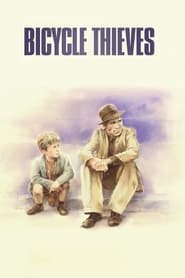The bedsheets and linen in the pawnbrokers remind me of the (moneyed) collection of Citizen Kane's items at his Xanadu estate, or the (bureaucratic) warehouse in Indiana Jones and the Raiders of Lost Ark.
We assume [Bruno's] maturity has grown from the trappings of a social-economic upbringing where he has had to learn quickly that the innocence of childhood alone could not protect him from starvation.[…]
It is true that the medium of cinema was a largely proletariat form of entertainment in its earliest configuration, but for the lower classes in Bicycle Thieves to venture into a movie theatre as a form of escapism would be seen as a luxury and not something affordable. [P]erhaps the thieves target Ricci because of what the posters he is hanging up in the exteriors of the city represents - everything that is unattainable to them.
[…]
[The bicycle] was the gateway to their dreams and its status as missing is a strain that threatens to plunge them into even deeper poverty. The bottom line is that everyone in the family is alive and safe, so bad times can’t last forever can they?
[…]
[Leader actor] Lamberto Maggiorani was laid off from his factory job because his employers wrongly assumed that he had earned millions from this acting role, and therefore would be an ideal redundancy candidate when budget cuts needed triggering. [T]hose Rita Hayworth posters bring temporary rewards, but are soon ripped down and pasted over. That is severe realism trumping over an impractical Hollywood flight of fantasy.
With Italy reborn not as a socialist paradise but as a capitalist purgatory beset with massive unemployment (the postwar boom had yet to launch), the film teeters between ongoing idealism and encroaching melancholy, a place where the earnest formulas of ideology are deepened by the intuitions of tragedy.[…]
Like The Children Are Watching Us (1944) and Shoeshine (1946) before it, Bicycle Thieves uses children as characters whose innocence interrogates the dubious adult authority around them.
[…]
A second viewing of the film might suggest that [the father-son relationship] has been the main drama all along, that Bruno has been “looking after” Antonio in several senses that point us toward the film’s justly famous final moments, when a touching gesture of filial solidarity replaces the class solidarity that De Sica and Zavattini evidently saw as receding in Italy.
— Godfrey Cheshire (Criterion)
With shots of tall buildings that tower out of the frame and loom over human figures in the foreground, or a sequence in a depository where thousands of sets of bedding are seen to have been traded in for quick cash, there’s an invisible, abstract entity that looms throughout. Whether that’s God, fascism, or something else, De Sica never makes explicit.[…]
Antonio’s hunt for a thief into an obsessive, wit’s-end pursuit. The film is imbued with his paranoia [—] Antonio’s ultimate decision to become a thief himself may be just as predicated on a questioning of his own sanity as it is his sense of defeat.
[…]
[Bruno] can name the make, model, and design of the missing bicycle, which is more spoken specificity than any character receives throughout the entire film. The scene could be viewed literally, as Bruno simply having an affinity for the bike, but it also speaks to a greater sociological problem, where material objects have begun to take precedence over human lives.
— Clayton Dillard (Slant Magazine)
De Sica gained control of traffic lights in Rome’s busy Largo Tritone crossroads to switch the traffic on or off at just the right moment during the climactic sequence. Such tactics meant De Sica could organize massive scenes without the need of hiring hundreds of extras, while also maintaining stylistic control from a distance.[…]
Joe Breen’s American Production Code tried, and failed, to cut two scenes from the U.S. distribution, leaving a shot inside a brothel and another of Bruno nearly peeing in the film—moments which, for many, signaled the downfall of the Production Code.
— Brian Eggert (Deep Focus Review)
In Sight and Sound in 1950, chafing against the neorealist tag, Vittorio De Sica argued that his real goal in films such as Bicycle Thieves (1948) was not simply to capture reality but to “transpose [it] into the poetical plane”. He did not see any future in neorealism unless it “surmounted the barrier separating the documentary from drama and poetry”.
— Isabel Stevens (Sight and Sound, December 2024)
To those [who] reproach me with excessive pessimism, because at the end of the film Antonio finds himself still without a bicycle, I should like to to put the question: how many times in your life have you found yourself in a hopeless situation at the end of a day, without being broken by it?
— Vittorio De Sica: Interview in Sight & Sound, April 1950.
Synopsis: Unemployed Antonio is elated when he finally finds work hanging posters around war-torn Rome. However on his first day, his bicycle—essential to his work—gets stolen. His job is doomed unless he can find the thief. With the help of his son, Antonio combs the city, becoming desperate for justice.

